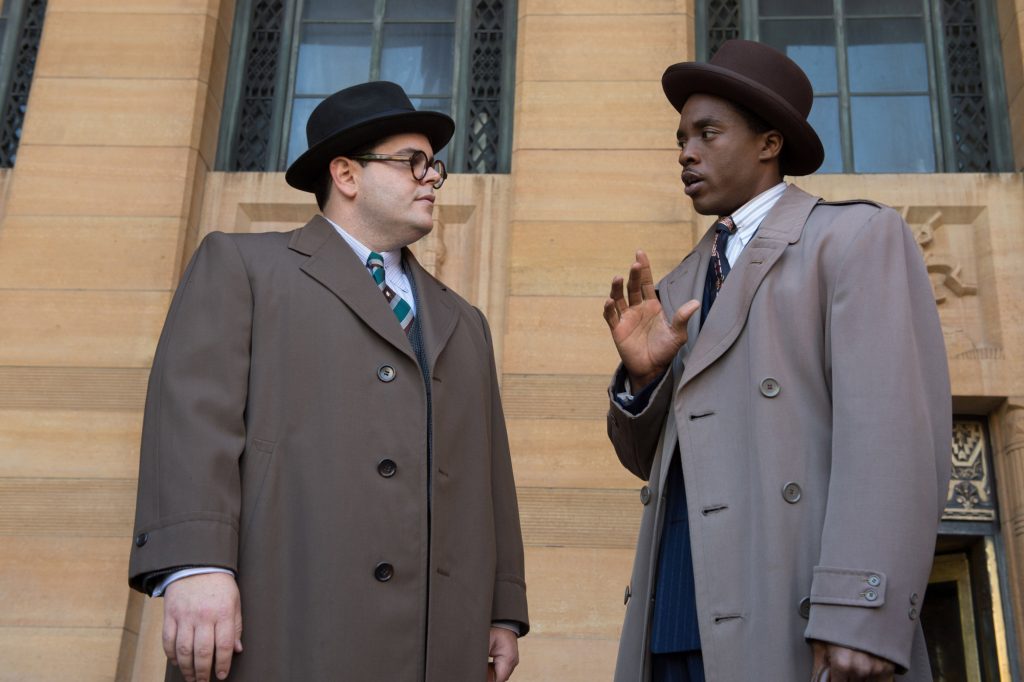
Marshall aims to be both a historical biopic and a courtroom potboiler for those who normally wouldn’t like either kind of movie, and it picks up plenty of wins in both areas. It treats its subject matter with a significant amount of gravity, but it never feels stodgy or dull.
Director Reginald Hudlin interjects more wry humor, awkward bonding and nuanced performances than one would expect. You wouldn’t initially think the case involving a black chauffeur, Joseph Spell (Sterling K. Brown), white socialite Eleanor Strubing (Kate Hudson) and what happened between them on a fateful night in Greenwich, Conn., would lead to two polar opposite personalities forming an interesting friendship, but lo and behold it does.

When the police pressure Spell into a confession, ace NAACP lawyer Thurgood Marshall (Chadwick Boseman) is assigned to his defense team to ensure a fair trial. His only real help comes in the form of Samuel Friedman (Josh Gad), an unassuming civil attorney who doesn’t have much in the way of criminal experience and is concerned for how the increasingly controversial case will impact his family’s well-being and career. Their odds don’t get much easier when Judge Colin Foster (James Cromwell, in full bore villain mode) will only recognize Friedman as Spell’s representation, barring Thurgood the chance to speak in the courtroom.

Understandably angered but undaunted, Marshall reluctantly decides to use the untested Friedman as his personal microphone, feeding him lines and his unique gifts of argument, while the two investigate the case in their off-hours.
The two banter back and forth (Thurgood can be a troll towards Sam, like in one scene when the two visit the bridge Spell allegedly threw Strubing off), get emotional and butt heads, but their chemistry is so strong that the audience will gradually root for the two to become closer. They both get interesting personal arcs, with Friedman gaining more confidence and Marshall thinking outside his usual comfort zones, as they craft a strong argument against the manipulative prosecutor Loren Willis (Dan Stevens).

As it’s a biopic that focuses solely on one particular event in Marshall’s career (and also follows much of Friedman’s story), there’s only so much analysis of Thurgood’s personality the film’s running time will allow. Jussie Smollett makes a big impression in his brief cameo as poet Langston Hughes, teasing Marshall at a jazz club, and it made me wish I could have seen more of their relationship. Boseman brings a considerable amount of swagger and confidence to his role as Marshall, and combined with the period piece costuming invokes a very “old Hollywood” demeanor.
He does get a fair amount of opportunities to show vulnerability, but his presence is mostly very forthright and controlled. Though his frustration with having to use Friedman as his voice is always evident, he does hone the inexperienced Sam into a powerful crusader for justice, both in terms of skill and being an inspiration. The two of them have a fun showdown with Strubing on the stand, resulting in some great performances by all three actors.

Did you ever think Olaf the Snowman and Black Panther would make such a great team? Me neither.
I’ve read a few reviews from critics who claimed they felt some of the lighter moments were a bit too distracting, and personally I never felt they got to that point. There are moments of mirth, but they’re used as brief interventions for what’s mostly a tense courtroom/crime drama, set against the backdrop of the racial politics in 1940’s America. It’s especially evident in scenes like when Marshall delivers a profound speech to a group of reporters, and when he tries to keep Spell honest and upfront with the truth about his encounter. Here, Sterling K. Brown shows off some impressive emotional range that only adds to his role’s complexity.
Even though Marshall is a condensed movie, it has enough timely subject matter, great performances, and intriguing mystery to make it feel epic in scale without following the usual biography conventions. It almost feels like the writers have developed a character that would be ideal for a film franchise, and doesn’t the first Black Supreme Court Justice deserve something that cool? In the wake of other succinct biographical films like Lincoln and Selma, this is another entertaining entry in that category, and also a good detective story to boot. Strongly recommended.
